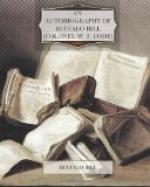“Boys, here’s Buffalo Bill!” Thereupon three rousing cheers ran all the way down the line.
Colonel Wier presented me to General Terry. The latter questioned me closely and was glad to learn that the alarm had been a false one. I found that I was not entitled alone to the credit of having frightened the whole Seventh Cavalry. The Indian scouts had also seen far behind me the dust raised by Crook’s troops, and were fully satisfied that a very large force of Sioux was in the vicinity and moving to the attack.
At General Terry’s request I accompanied him as he rode forward to meet Crook. That night both commands went into camp on the Rosebud. General Terry had his wagon-train with him, so the camp had everything to make life as comfortable as it can be on an Indian trail.
The officers had large wall-tents, with portable beds to stow inside them, and there were large hospital tents to be used as dining-rooms. Terry’s camp looked very comfortable and homelike. It presented a sharp contrast to the camp of Crook, who had for his headquarters only one small fly-tent, and whose cooking utensils consisted of a quart cup in which he brewed his own coffee, and a sharp stick on which he broiled his bacon. When I compared these two camps I concluded that Crook was a real Indian fighter. He had plainly learned that to follow Indians a soldier must not be hampered by any great weight of luggage or equipment.
That evening General Terry ordered General Miles, with the Fifth Infantry, to return by a forced march to the Yellowstone, and to proceed by steamboat down that stream to the mouth of the Powder River, where the Indians could be intercepted in case they made an attempt to cross the stream. The regiment made a forced march that night of thirty-five miles, which was splendid traveling for an infantry regiment through a mountainous country.
Generals Crook and Terry spent the evening and the next day in council. The following morning both commands moved out on the Indian trail. Although Terry was the senior officer, he did not assume command of both expeditions. Crook was left in command of his own troops, though the two forces operated together. We crossed the Tongue River and moved on to the Powder, proceeding down that stream to a point twenty miles from its junction with the Yellowstone. There the Indian trail turned to the southeast, in the direction of the Black Hills.
The two commands were now nearly out of supplies. The trail was abandoned, and the troops kept on down the Powder River to its confluence with the Yellowstone. There we remained for several days.
General Nelson A. Miles, who was at the head of the Fifth Infantry, and who had been scouting in the vicinity, reported that no Indians had as yet crossed the Yellowstone. Several steamboats soon arrived with large quantities of supplies, and the soldiers, who had been a little too close to famine to please them, were once more provided with full stomachs on which they could fight comfortably, should the need for fighting arise.




